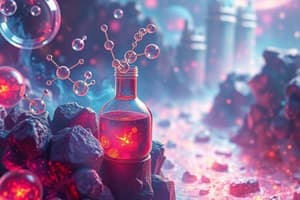Podcast
Questions and Answers
What is the primary function of carbohydrates in the body?
What is the primary function of carbohydrates in the body?
Which of the following examples is a source of lipids?
Which of the following examples is a source of lipids?
Which of the following elements is NOT found in proteins?
Which of the following elements is NOT found in proteins?
What is the role of nucleotides in living organisms?
What is the role of nucleotides in living organisms?
Signup and view all the answers
Why is water crucial for survival compared to food?
Why is water crucial for survival compared to food?
Signup and view all the answers
What is the primary reason ice floats in water?
What is the primary reason ice floats in water?
Signup and view all the answers
Which of the following defines an organic compound?
Which of the following defines an organic compound?
Signup and view all the answers
Cohesion differs from adhesion in that cohesion refers to:
Cohesion differs from adhesion in that cohesion refers to:
Signup and view all the answers
Why is water crucial for survival longer than food?
Why is water crucial for survival longer than food?
Signup and view all the answers
Which of the following biomolecules is NOT typically found on nutrition labels?
Which of the following biomolecules is NOT typically found on nutrition labels?
Signup and view all the answers
Study Notes
The Chemistry of Living Things
- Biochemistry is the study of the chemical processes in living organisms.
Objectives
- Relate the unique properties of water to its importance for living things.
- Define organic compounds.
- Distinguish organic compounds from other kinds of compounds.
- Compare the structures and functions of carbohydrates, lipids, proteins, and nucleic acids.
Essential Question
- Why can you survive longer without food than without water?
Cohesion and Adhesion
- Cohesion: The attraction of water molecules to each other.
- Adhesion: The attraction of water molecules to other substances besides water.
Polarity
- Ice floats in water due to its unique properties, which differ from those of most other substances.
- Water is in a solid state (ice) when it's less dense than its liquid state.
Organic Compounds
- Organic compounds are covalently bonded compounds containing the element carbon.
- The definition of "organic" in food science differs from the scientific definition.
Biomolecules
- Biomolecules, also known as molecules that make up living things, can be identified in nutrition labels.
- Biomolecules include carbohydrates, lipids, proteins, and nucleotides.
Carbohydrates
- Elements: Carbon, hydrogen, oxygen
- Function: Provide energy.
- Examples: Glucose, fructose, sucrose.
- Food Sources: Breads, fruits, starch, sugar, vegetables.
Lipids
- Elements: Carbon, hydrogen, oxygen
- Function: Store energy.
- Examples: Fats, oils.
- Food Sources: Butter, nuts, oil.
Proteins
- Elements: Carbon, hydrogen, oxygen, nitrogen
- Function: Build muscles, hair, blood, skin.
- Examples: Enzymes, hemoglobin.
- Food Sources: Beans, eggs, meat, poultry, seafood.
Nucleotides
- Elements: Carbon, hydrogen, oxygen, nitrogen, phosphorus
- Function: Contain genetic information.
- Examples: DNA, RNA.
Additional Considerations
- Similarities among biomolecules.
- Effects of changing structure/shape on biomolecules.
- Implications for how God designed living things.
Studying That Suits You
Use AI to generate personalized quizzes and flashcards to suit your learning preferences.
Related Documents
Description
Explore the fascinating world of biochemistry, where you'll learn about the chemical processes that sustain life. This quiz covers the unique properties of water, organic compounds, and the structures and functions of key biomolecules like carbohydrates, lipids, proteins, and nucleic acids. Understand why water is essential for survival compared to food.




